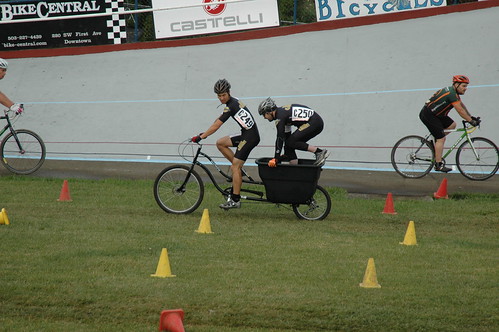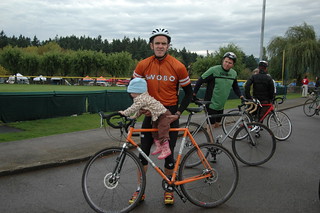
Getting ready to jump over a hurdle at a 2009 ‘cross race.
Cyclocross season is well underway. It’s something of a local pastime here in Portland, with serious road racers enjoying a chance to eat waffles and get muddy (well, this year it’s more like dusty) in a cheery, open environment. Many everyday, regular, jeans-and-a-t-shirt bike commuters hear the siren song of the beginners’ races, with their friendly competition. Unlike the *very serious* sport of road racing, ‘cross is wide open: there are races for all levels, races for your kids, even a race for your dog.
Another local pastime here in Portland is talking about equality. We’re good at that. But that isn’t always translated into action, and that’s a shame — especially in cyclocross, where a dynamic and growing women’s field in one of our biggest and most venerable ‘cross series gets plenty of cheering but …only a fraction of the prize money, also known as payout.
My friend Caroline, who’s a serious math head as well as one of the fastest people I know on any kind of bike (though she’s traded in ‘cross for downhill mountain biking and BMX lately), ran the numbers on participation, race income, and payout in last year’s Cross Crusade series, breaking it down by gender. And the conclusions she came up with ought to change the game — for all bike races.
She calls for equal payouts for the same-level mens’ and women’s fields, regardless of participation, and does a good job abolishing the various arguments against doing so she’s heard over the years. The biggest one is the somewhat self-fulfilling one that only 26% of the Cross Crusade racers are women, so the fact that the payout for the women’s fields is 37% of the total is actually quite generous. In response, Caroline came up with this analogy, and gave me permission to post it here:
One interesting example would be if the video arcade only issued prizes to people based on how many women vs. men walked in the door that day. Everyone pays the same entry and is given the same number of coins to play with. Sometimes it seems the men are naturals at most the games but many women are very good at it, too.
Say two women and twenty men come through the door. A woman wins tons of reward tickets with her coins, but still doesn’t get a prize because not enough women came and paid entry in to justify women getting a prize. She did better than the other woman, and better than many of the men, but “It’s not fair to the men who paid more (as a group) to get in.” This is counting the men as a group against the women, and not counting them as humans entering an arcade INDIVIDUALLY, paying money on their own, to play a game of chance.
The problem is discriminating based on sex and disguising it as objective discrimination based on number. “Not enough women show up to reward big payouts.” But for example, very few men’s As show up compared to men’s Master Cs, and yet men’s As take away much more payout than Master Cs. If payout really was connected with who was paying it, the Master Cs would take home much more money. That argument is deflated.
Award should be based on who goes fastest in their overall category, not who shows up in the biggest numbers. The fastest women should also be earning great reward, as humans entering a race INDIVIDUALLY, paying money on their own, to race skill and strength against chance. Losers forfeit.

The next generation of racer… maybe.
Women want to race, Caroline says, but the incentives aren’t there. The pot of money to pay women who race just as hard and at the same level as equivalent mens’ races is often half the size or less. Perhaps this money gap supports the unpaid division of labor, too — the culture at races of women watching the kids, cheering on their spouses, brothers, and dads, and cooking dinner at the end of the day. Lots of women do race ‘cross, for the fun and glory of it as well as for the prizes, but the payout isn’t just about money — it’s a loud and clear message about ‘cross culture’s priorities.
Her hypothesis: Give equal payouts a try and see the number of women racing soar. It’s a fraction of the budget of the race series, and it has the potential to increase the race’s revenue substantially. It might take a couple years for new racers to get inspired by their peers and train for the next season, but I think it just might work.
And this would not just work for Cross Crusade — which is already one of the more women-friendly bike racing events out there. Any race organization that wants to bring in fresh new blood and increase its participant base as well as its potential audience and media interest, should take this article to heart. It’s worth reading her entire argument. Check it out here. And then share it with your local race organizer. Or how about with those folks who run the Tour de France?